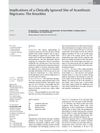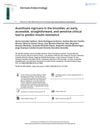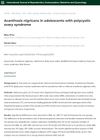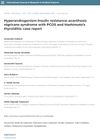 April 2023 in “Journal of Investigative Dermatology”
April 2023 in “Journal of Investigative Dermatology” PX-12 may help treat psoriasis by blocking inflammation and cell death.
 21 citations,
May 1989 in “Advanced Drug Delivery Reviews”
21 citations,
May 1989 in “Advanced Drug Delivery Reviews” Liposomes show promise in cancer treatment by delivering drugs with less toxicity and improved effectiveness.
 13 citations,
January 2013 in “Applied and Environmental Microbiology”
13 citations,
January 2013 in “Applied and Environmental Microbiology” A gene in Sebekia benihana, CYP-sb21, is needed for a specific reaction on the drug Cyclosporine A, which could be important for hair growth without affecting the immune system.
 3 citations,
May 2023 in “Frontiers in immunology”
3 citations,
May 2023 in “Frontiers in immunology” Faulty inflammasome activation may lead to autoimmune skin diseases and could be a target for new treatments.
 April 2024 in “Frontiers in pharmacology”
April 2024 in “Frontiers in pharmacology” Cynoglossum amabile has medicinal potential but poses safety concerns due to liver toxicity.
 9 citations,
December 2022 in “Phytomedicine”
9 citations,
December 2022 in “Phytomedicine” More high-quality research is needed to recommend flavonoids and saponins for clinical use.
October 2023 in “Applied sciences” Iris germanica rhizome-derived exosomes help protect skin cells from oxidative stress and aging.
1 citations,
September 2021 in “Nigerian journal of medicine : journal of the National Association of Resident Doctors of Nigeria” Androgenetic alopecia is common in South-West Nigeria, affecting more men than women, with stress worsening the condition.
 April 2023 in “Nigerian Journal of Clinical Practice”
April 2023 in “Nigerian Journal of Clinical Practice” Hair loss in adults is linked to heart disease risk factors like unhealthy blood fats, lack of exercise, and alcohol use. It's also slightly more common in people with metabolic syndrome. As people age, hair loss gets worse. In men, severe hair loss is tied to high blood pressure and a larger waist. In women, it's tied to higher body weight. People with hair loss should be checked for unhealthy blood fats and advised to avoid alcohol and inactivity.
 August 2020 in “Nigerian journal of paediatrics”
August 2020 in “Nigerian journal of paediatrics” A 24-month-old Nigerian girl developed early puberty with no family history, needing treatment her family couldn't afford.
 43 citations,
May 1988 in “British Journal of Dermatology”
43 citations,
May 1988 in “British Journal of Dermatology” Patients with acanthosis nigricans often have insulin resistance and signs of increased male hormones, but treatment targeting these male hormones is generally ineffective.
 30 citations,
September 2017 in “Clinics in Dermatology”
30 citations,
September 2017 in “Clinics in Dermatology” Acanthosis nigricans is a skin condition that may indicate a higher risk for insulin resistance and type 2 diabetes, and more research is needed to understand and treat it.
 9 citations,
October 2014 in “Experimental and Clinical Endocrinology & Diabetes”
9 citations,
October 2014 in “Experimental and Clinical Endocrinology & Diabetes” Knuckle Acanthosis Nigricans is common in Latin American youth and may indicate early insulin resistance, especially in those with normal weight.
 7 citations,
January 2015 in “Case reports in endocrinology”
7 citations,
January 2015 in “Case reports in endocrinology” The document concludes that HAIR-AN syndrome should be considered when a patient shows severe hyperandrogenism and insulin resistance after excluding tumors.
 6 citations,
January 2018 in “Dermato-endocrinology”
6 citations,
January 2018 in “Dermato-endocrinology” Darkened knuckles can be an early sign of insulin resistance.
 6 citations,
February 2014 in “Human & experimental toxicology”
6 citations,
February 2014 in “Human & experimental toxicology” Testosterone injections can cause skin darkening and thickening.
4 citations,
May 2012 in “BMJ Case Reports” A Nigerian baby with neonatal lupus got better with treatment by 6 months.
3 citations,
February 2002 in “The American journal of psychiatry” Stopping birth control pills may have triggered a manic episode in a woman with HAIR-AN syndrome.
 1 citations,
January 1996 in “Gynecological endocrinology”
1 citations,
January 1996 in “Gynecological endocrinology” Non-invasive imaging helped diagnose a woman's severe hormone imbalance and diabetes, and medication successfully treated her condition.
 February 2022 in “International journal of reproduction, contraception, obstetrics and gynecology”
February 2022 in “International journal of reproduction, contraception, obstetrics and gynecology” Acanthosis nigricans in teenage girls with PCOS is a sign of obesity, not insulin resistance or glucose intolerance.
April 2018 in “African journal of rheumatology” A Nigerian teenager was diagnosed with neuropsychiatric lupus, showing various severe symptoms and abnormal lab results.
 January 2017 in “Journal of clinical & experimental dermatology research”
January 2017 in “Journal of clinical & experimental dermatology research” The case shows skin changes can indicate deeper health issues like insulin resistance, which are challenging to manage.
 January 2015 in “International Journal of Research in Medical Sciences”
January 2015 in “International Journal of Research in Medical Sciences” A patient with HAIR-AN syndrome, PCOS, and Hashimoto's thyroiditis improved with early diagnosis and treatment to prevent serious health problems.

The conclusion is that there's a link between high testosterone levels, insulin resistance, and certain skin conditions, regardless of obesity.
 23 citations,
March 1994 in “Fertility and sterility”
23 citations,
March 1994 in “Fertility and sterility” Most patients improved with oral contraceptives, but some needed additional treatment.
 2 citations,
January 2018 in “Open Journal of Obstetrics and Gynecology”
2 citations,
January 2018 in “Open Journal of Obstetrics and Gynecology” A significant number of Nigerian women struggling with infertility have Polycystic Ovary Syndrome, with the exact percentage varying based on the diagnostic criteria used.
 October 2018 in “International journal of reproduction, contraception, obstetrics and gynecology”
October 2018 in “International journal of reproduction, contraception, obstetrics and gynecology” Higher testosterone levels in Nigerian women with PCOS are linked to glucose disorders like diabetes.
49 citations,
February 2009 in “Clinical Rheumatology” SLE is more common among Nigerians than previously thought, especially in women, requiring early treatment.
 26 citations,
November 2009 in “Journal of Endocrinological Investigation”
26 citations,
November 2009 in “Journal of Endocrinological Investigation” Certain gene variations are not a major cause of male infertility in Nigerian men.
8 citations,
October 2006 in “Journal of Experimental and Clinical Anatomy”























